« October 2009 | Main | December 2009 »
November 30, 2009
Southeast Asia: Hari Raya Puasa
At Richard D. Lewis's fine Cross-Culture, see "Malaysia: An 'Open House' Tradition", by Martin Králik, on the Eid al Fitr holiday as practiced in Malay culture. Eid is a three-day celebration that marks the end of Ramadan, the Islamic holy month of fasting. Excerpts:
Thanks to the staggering growth in Malaysia’s prosperity over the past thirty years, however, the core festival alone has evolved into a lavish, week-long celebration. The follow-up social activities fill up everyone’s calendar for several weeks.
In the morning of the first day of Hari Raya, people ask forgiveness of their parents and siblings for any slights they may have committed or harsh words uttered in the past year.
The Malay psyche is marked by humility and being closely in touch with one’s emotions: the sight of adults kneeling on the floor in front of a parent and weeping openly is not uncommon even among Westernized, UK- and Australia-educated professionals.
Posted by JD Hull at 08:54 AM | Comments (0)
November 28, 2009
Got a Little Black Book for you right here. But are you ready to do some work?
Note: Below is review of a very fine new book by Miami's Paula Black we did in August 2009. This holiday season "Black's book" would make an enduring and appreciated gift to savvy clients, to their fancy corporate lawyers, to many other services professionals--and even to certain family dogs. It's quite a book, folks.
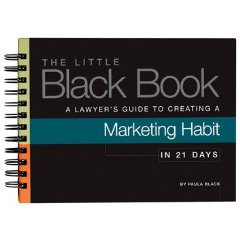
Most books on marketing professional services or client service--at WAC? we are asked to review quite a few of them and we usually get around to it--hit us the same way:
You just died and went to Hallmark.
For an instant, it's an immediate signal-sanction from the Cosmos of what kind of life you have led here on Earth--in case you did not understand before. It's physical.
You sag, visibly, like an animal taking a bullet. Your punishment. It came early.
And then you read on. These books tend to end the same way: "nurturing the relationship"--like that notion was revolutionary.
All of the books, to be fair, make sense. And they are all written by nice people. Especially the "marketing" books.
But rarely are any of them crafted to make things "stick." Or even make "sticking" a priority.
Then you wake up--and realize you have to write something nice. You put it off for a few more months, and go back to billing hours. There is simply nothing remarkable about that new nice book.
Well, not so for Paula Black's The Little Black Book: A Lawyer's Guide to Creating a Marketing Habit in 21 Days.
If you read this blog, you know that we think that for those with repeat corporate clients, or for those who would like such a happy component in their business model, you are always marketing when you are working. You work for a client; you are marketing right there. And woe to you and yours if you do not get that.
But we also think that very few of you have the discipline to make marketing, along with client service, a "frame of mind." In fact, we are sure of it. But the Little Black Book handles the discipline of habit-building admirably. And we like it for reasons which range from the critical and important to the purely whimsical and personal:
1. LBB is about getting quality habits--building them. The book takes you through a regimen of three weeks of getting your mind "right." There's an emphasis here on using three built-in sources of work: (a) current and former clients (everyone blows this), (b) marketing within your firm (no one can get this right, either--but Paula Black, again, does), and (c) joining organizations, which she does freshly. On (c), personally, I think of it differently--but mainly it's a matter of perspective and stress: my take is that you should focus your efforts on "influencers"--not so much organizations--who know, control or have the respect of hundreds of others.
2. The book is aesthetically pleasing. Graphically, it's a masterpiece. In fact, it's gorgeous. You might buy it just for its mode and technique of narrative. WAC? is famously shallow--it's no secret that a person who moves from D.C. to southern California just wants to get in touch with his inner cad--and just likes pretty things.
3. The book is literally indestructible. It's pretty heavy--at least a pound--and relatively flat at 155 glossy and quite durable pages. Distinctively and "horizontally" crafted (see above). On a recent trip to Alaska, I threw it four times to the three resident big goofy Labradors outside the lodge as far as I could throw it toward the boats and planes tied up on shore. They chased it, fought over it, and brought it back. All we had to do is hose LBB off. I could still pass it around at dinner. Even the ringed binding was intact. Perfect.
4. We just like the name of the book. There was once a book with a similar name I had written myself when I was in law school and working in D.C. before I was married that changed my life several times a week.
5. It contains actual advice from forty fancy lawyers who "get it"--including the IBLC's Paris member, a first rate management-side employment lawyer, who my law firm both respects and likes very much, and I will see again in October.
6. It is well thought out, easy to read, beautifully written, hard to forget--and worth every penny this blog did not have to pay.
Just buy it. But read it and do what it says. Okay? It can forge a hard-won good habit--if you work at it.
Posted by JD Hull at 11:59 PM | Comments (0)
Practice tip: Do timely object to hand grenades.
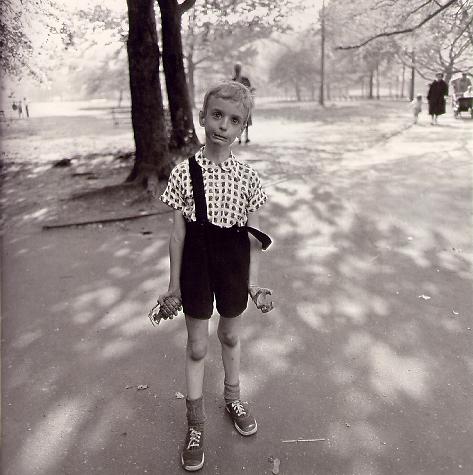
Diane Arbus, Central Park, 1962
Even without notice, you can let some stuff slide a little when it slips into defense counsel closings: photos, videos, a few power point slides, and maybe blow-ups of handwriting samples. No reason to object. But you never know about those wild cards: firearms, working chain saws, certain munitions, live-looking grenades, those sorts of things. So do pipe up--even if you think you're winning big with the jury in an "I-can't-lose-here" jurisdiction. See at ABA Journal "Lawyer Under Fire for Using Dud Grenade in Closing".
There was no objection and the presiding judge simply asked that Kepfield remove the grenade from the table.
Kepfield's client was convicted following 15 minutes of jury deliberations, according to the Hutchinson News.
The grenade closing prop was used in a demonstration of a "real" imminent threat. A complaining witness claimed that one co-defendant in the case threatened "to kill her dog and harm her daughter" if she would not assist in the forgery of stolen checks. No timely objection to the grenade. But here the winning prosecution apparently could have it both ways:
District Attorney Keith Schroeder intends to also alert the Kansas attorney general's office.
"Clearly, I'm concerned about the situation and the safety of my employees, and I'm concerned about the way the jury's treated," Schroeder said.
Posted by Rob Bodine at 12:00 AM | Comments (0)
November 25, 2009
Greenfield
No computer will ever win a case. No gadget will replace the mind that drives the fingers that push the buttons.
SHG, Simple Justice, November 24, 2009

NYC's Scott Greenfield in November 2004, days before alleged hunting accident in Hamptons.
Posted by JD Hull at 11:00 PM | Comments (2)
Dudes, man up! You can do it! Get a spine. Get a life. Use your real name on the Internet.
You went full retard, man. Never go full retard. Don't go home in pain.
--Robert Downey, Jr., gravely, to Ben Stiller, in Tropic Thunder (2008), about the latter's acting method in the fictional flick "Simple Jack". (DreamWorks/Red Hour Films)
Effective July 1, 2009, and absent compelling reasons, this blog deletes any comments of anonymous bloggers and commenters. Sorry if you said something touching, worthwhile or brilliant. But nameless blogosphere participants, in our view, are rarely worth anyone's time, thought, or respect. Anonymous writers have already "discounted" themselves. You can discount them, too, without worrying you're missing anything. They are second-class citizens, at best. See our past posts on the subject here and here.
Above: The highly-respected French Resistance in action. Twenty-first century counterparts may qualify for a WAC? No-Anonymity Rule special needs exemption.
Posted by JD Hull at 03:59 AM | Comments (0)
November 23, 2009
Wanted: Improved, higher-functioning, digitally-competent Boomers.
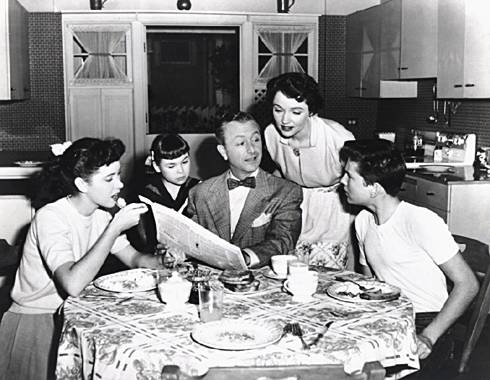
CBS
Baby Boomers were the first generation to grow up with TV--so why can't we take the next steps? Gen-Y and Gen-X are very right about one thing: Boomers really are big babies, and often arrogant, about Tech. We are above it, some of us think. But we aren't--and can't be. Time to grow up.
Boomers: They just don't [heart] tech enough. For a lawyer, and especially one born between 1946 and 1966, I'm not too bad at science, or even math. Geometry came easily. Calculus not so easily. At my mega-competitive college prep high school in Cincinnati, I was always one of the handful of underachievers in the mega-smart kids' math class. Those who went on to careers in medicine could always count on me to skew the grades in their direction.
I liked the Humanities much better, and still do. Science, Math, Tech, Numbers. It wasn't that they were hard; it was that they seemed, at the time, to lack mystery. Nowadays, and in doses, I do like playing with business numbers, market shares, and even budgets. Some people even say I'm good at it. But none of it really turns me on.
Numbers and the often-mathematical elegance of the Universe? Okay, I'm older now. It's all there--I admit it. But if something has "one" answer, or fits into a recognized theory, or model, it's still not as interesting to me as things that are, well, more complex, impossible to sort out quickly with Western logic, metaphysical.
I strongly associate "the need for certainty"--either scientific or moral, in either nature or society--with small ideas and small minds. I am sure that I am wrong about that. I am wrong, and wrong-headed, about many things.
Same with the new Digital World. And Word Processing, Document Management, Graphics. Frankly, I don't like any of "it"--and prefer others (always younger) do "it" for me. Documents especially. I do not like to type them, create them, edit them, manage them, store them and retrieve them. Secretly, I do not even like computers, cell phones, video-conferencing, anything electrical--and never will. I like humans, voices, winks, laughs, sneers, grimaces, smiles, flirtations, handshakes, and bodies in the room.
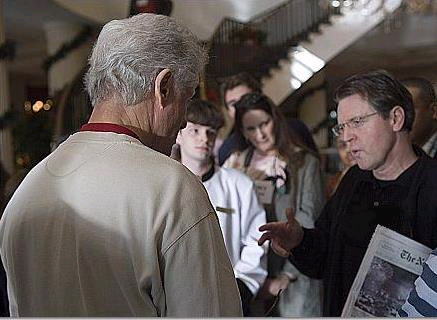
Boomer lawyers discussing Cicero, Flaubert, existential dread, and EU politics before getting their Tech thing on.
But hating computers is hurting me--and wasting the time of others who I demand do it for me. I am working more and more on my tech. (If you think by the way that operating a blog is "technical", think again; the blogging platforms available make that all very easy.)
Gen-Y and Gen-X are very right about one thing: many Baby Boomers really are babies, and often arrogantly helpless cretins, about Tech. We are above it, we think. Well, we are not above it. We cannot be.
So for a guy who wrote his big thesis at Duke for a Japan history seminar on "How the Shishi Got the Chutzpah to Overthrow the Bakufu", I have come a long way with Tech.
But not far enough. I still drive two nice consultants in two cities crazy with my whines about the equipment, the programs, all the changes, all the... So I need to learn and keep doing more. I still prefer Boomers for co-workers, having given up on younger generations for the time being. Boomers will work long and passionately into their sixties, seventies and even eighties. They are never offended by hard work or complex problems. They don't think that digital toys make your work better--and they are right about that. Boomers like complexity, ambiguity, and genuinely hard problems. Gadgets? They just make you coffee, or give you a copy.
I'd rather work with a 50-year-old than anyone because he or she, generally, will go on until the last dog dies. Never prissy. Always engaged. Nothing is too hard. Boomers are "Foxhole People" to the core.
The tools of the digital world--creation, management, storage, retrieval and shipment of documents--may not make the work product better. But it does make work easier. The over-45 crowd must stop relying on younger people to do that work. And we must quit whining about Tech, and having to learn it. We cannot afford to be above it any longer.
Boomers, to be sure, are still digitally-challenged--and under-performing on Tech. We are too content to be able to turn computers on and off, send and receive e-mail, and use search engines. We were the first generation to grow up with TV--why can't we take the next steps?
So it's not enough. I promise to learn more. Anybody with me?
Posted by JD Hull at 11:59 PM | Comments (3)
November 22, 2009
Yes. But New Orleans birthed "it".
Posted by JD Hull at 12:47 PM | Comments (1)
November 16, 2009
"Hello, my name is Amy Walker."
Dialect. Here's a bit of talent, some fine digital self-promotion and--best of all--a quick trip through the English-speaking West.
Posted by JD Hull at 09:14 PM | Comments (1)
November 15, 2009
Clients: How to ditch bad ones.
Just drop off the key, Lee. Even hard-working, über-competent and genuinely service-oriented companies--all 5 or 6 of them on the planet--have at one time or another found themselves with a client, or customer, they no longer "like". To deal with that problem, see "Top 10 Ways to Fire the Client from Hell" at InsideCRM.
It's full of useful tips for dealing with just-not-getting-it or lawyer-paranoid clients like (1) the bargain shopper, (2) the control freak, (3) the "one who's never satisfied" or (4) the client who sees evil and imperfections everywhere.
Posted by Tom Welshonce at 12:59 AM | Comments (0)
November 10, 2009
Crossroads are every day, Jack.
Posted by JD Hull at 09:10 PM | Comments (0)
November 06, 2009
Don't compete on price--especially now.
If a new client demands a "discount", color it unsophisticated and a pain in the ass. Refer it to that firm down the street you just never liked.
If a client comes to your firm for price, it will leave your firm for price. Value--not price alone--is the point. You're in a services profession, so value will be conferred upon, and experienced differently by, different clients in different engagements.
It's all in the work, i.e., first rate legal products mixed with real client service for every client you serve--and, of course, the billing. About billing: it's case by case, it's very hard, and it takes thought. But no matter how your firm bills--hourly, "value", flat or a combination--don't lower the price for your firm's services, especially for new clients or to attract work.
Don't lower rates to get business. Don't change anything. If a new client--especially via an in-house lawyer (but we doubt you'll see this happen)--demands a "discount" these days, it is likely both unsophisticated and a pain in the ass. Refer it to that firm down the street you just never liked.
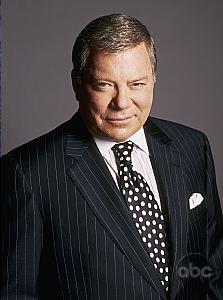
This man doesn't "do" discounts to get work for his law firm. Either should you. (Photo: ABC)
Posted by JD Hull at 11:59 PM | Comments (0)
November 03, 2009
On voting for judges.
That a popularly-elected state judge in your pocket?

Judges should not have "constituents." But in most American states, they still do. And there is no way to dress that up.
Election Day Reminder: If you can vote at the polls for a state judiciary candidate today, please don't. Raise your aspirations. Go to the track, play pinball, drink Ripple, watch Gong Show reruns, or visit that "Leather World" alternative lifestyle clothing-and-book store on Route 73 you've always wondered about. From past WAC? posts:
Quick and dirty re: elected state judges and campaign money. We've followed and written a lot on the U.S. Supreme Court case about a popularly elected state supreme court judge, and campaign money recipient, who failed to disqualify himself in arguably suspect circumstances. The Court ruled in June of this year that a West Virginia judge should indeed have disqualified himself from hearing an appeal of a $50 million jury verdict against an a coal company because its CEO had been a major campaign donor. See slip opinion in Caperton v. Massey Coal Company (June 8, 2009).
The popular election of state judges--permitted in some aspect in a clear majority of the states--gives the appearance of justice being "for sale." Elected judges can be especially "bad" for good clients who do business all over the U.S. and the world. Even when elected judges are "good"--and, to be fair, there are some great ones--state systems of popularly-elected judiciary will never inspire much confidence. Elected jurists who hear and decide business disputes are steeped in a taint.
The point: Judges should not have "constituents," i.e. law firms, and their clients, who make campaign contributions. Right now, in most American states, they do. And there is no way to dress that up.
Generally county-based, American litigation at a state level is already frustratingly local and provincial for "outsider defendants"--businesses from other U.S. states and other nations sued in local state courts--who cannot remove to federal courts, the forums where federal judges can and should protect them from local prejudice.*
American states that still hang on to electoral systems look increasingly provincial, classless, and silly from a global perspective. Merit selection is not perfect--and also poses risks--but it is far better than what most American states currently have in place. It's time for American states to grow up. See our many past posts over the last four years on this subject in our category on the right side of this site: Federal Courts.
*One reason that federal diversity jurisdiction was created in the first place was because of the framers’ concern that prejudices of state judges toward out-of-state persons would unfairly affect outcomes in trial courts. Erwin Griswold, Law and Lawyers in the United States, 65 (Cambridge, Harv. Press 1964). Over 200 years later, our current systems in the states make that local prejudice almost inevitable. See also, the interview by General Electric's Mike McIlwrath in July 2009 of Prof. Geoffrey Hazard of Hastings Law School, who addresses why European business really fear U.S. state courts.
Posted by JD Hull at 11:59 PM | Comments (0)